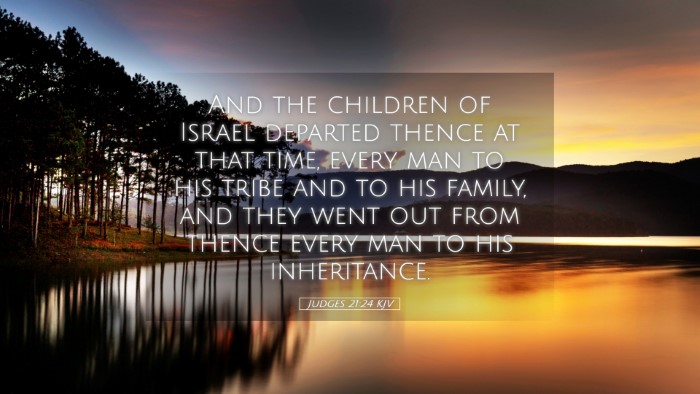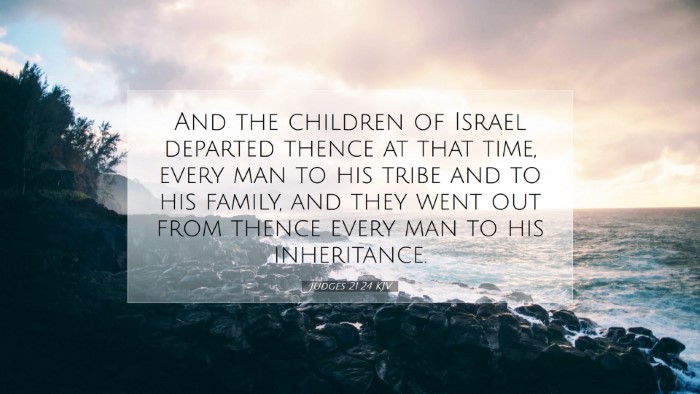Commentary on Judges 21:24
Verse Context: Judges 21:24 states, "And the children of Israel departed thence at that time, every man to his tribe and to his family: and they went out from thence every man to his inheritance." This verse encapsulates a concluding moment in the Book of Judges where the Israelites return home after the events of civil strife and the tragic conclusion of the conflict with the tribe of Benjamin.
Structural Analysis
The verse functions as a narrative closure, emphasizing the restoration of the tribes of Israel to their individual inheritances after a period of turmoil. Understanding the background leads to appreciating the significance of this return to family and land.
Theological Implications
Restoration and Inheritance: The theme of inheritance is vital, showcasing God’s faithfulness to His people. The land signifies not just physical ownership but also spiritual unity and identity. As Matthew Henry notes, the act of each person returning to their inheritance symbolizes a return to God’s covenant promises.
Historical Context
The conclusion of Judges follows a series of disturbing accounts of Israel’s moral decline. Albert Barnes remarks on the chaotic nature of Israel’s society during this period, where "every man did that which was right in his own eyes." The return to familial units can be seen as an attempt to restore order amidst chaos. This underscores the instability and the need for guidance from God’s larger plan.
Key Themes
- Leadership Vacuum: The absence of central leadership during the time of the Judges resulted in fragmentation and individualism. Clarke points out that the shift towards familial independence can both reflect the fulfillment of God's promises and the consequences of moral and spiritual degradation.
- Family Unity: The emphasis on families returning emphasizes the significance of familial bonds in maintaining spiritual and social order. This invites pastors to consider the familial structures in modern congregations and their role in the broader community.
- Community and Identity: The tribal nature of Israel reinforces the idea that community and identity are integral to understanding God's covenant. Each tribe’s return signifies a restoration of community ties, crucial for understanding Israel’s identity as God's chosen people.
Practical Applications
For contemporary practitioners of faith, this verse serves as a reminder of the importance of returning to our roots—the foundations of faith that ground our identities in God. It suggests an introspective approach to how one perceives their place in the community of believers and their inheritance from God.
For Pastors:
Pastors might reflect on how to encourage congregants to recognize their spiritual inheritances and the importance of familial and community ties in their walk with God. This verse could be a springboard for sermons on community restoration, emphasizing the characteristics of God as a restorer of relationships.
For Students and Theologians:
This passage invites deeper examination of the cyclical nature of Israel’s history. The return of individuals to their tribes can be symbolic of the need for repentance and restoration in scholarly work. The commentary sheds light on how historical context shapes theological understanding.
Conclusion
Judges 21:24, while simple in its message, weaves together complex themes of restoration, identity, and community. The insights from Matthew Henry, Albert Barnes, and Adam Clarke collectively illuminate the necessity of recognizing the significance of both physical and spiritual inheritance. It encourages believers to reflect on their relationship with God, their families, and their communities, ultimately pointing to the hope of restoration found in Him.


